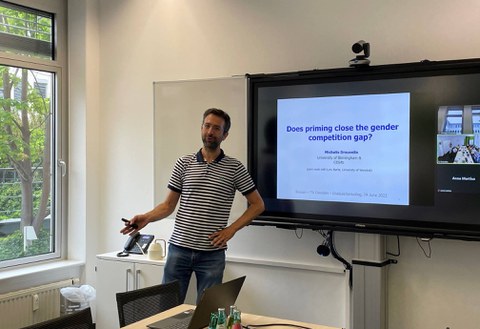Jun 30, 2022
Visiting scientist Michalis Drouvelis
How can appropriate language and priming (stimulus placement) help overcome gender differences in competitive behavior?
Michalis Drouvelis (University of Birmingham, Professor of Behavioural Economics)visited the Faculty of Business and Economics as Distinguished Research Fellow 2021 from June 7th to 30th, 2022. We have invited him to join us at the Boysen-TU Dresden Research Training Group.
In his lecture "Does priming close the gender competition gap?", Prof. Michalis Drouvelis presented his experiments in economics on June 29th, 2022. He conducts research on topics in the fields of behavioral economics and experimental economics. Experimental economics is a comparatively young sub-discipline of economics. It deals with the design, implementation, and evaluation of experiments based on economic models.
It thus builds a bridge between axiom-based modeling on the one hand and empiricism on the other. Among other things, economists use the method of laboratory experiments. In this way, boundary conditions and model variables can be controlled and specifically influenced. Behavioral economics deals with human behavior in economic contexts and is a cross-sectional discipline from microeconomics, psychology, and neuroscience.
After an introduction to the language and basic methods of his subject, Prof. Drouvelis presented us with his experimental research on the well-documented observation that women show a lower willingness to compete than men. A low willingness to compete is often perceived as undesirable, e.g. as a career obstacle. In his three-stage experiment, he quantifies the subjects' willingness to compete and treats it with the method of priming, i.e. the targeted placement of stimuli intended to influence subsequent behavior. The motivation to influence the willingness to compete not through monetary incentives but in a non-monetary way is based on the observation that monetary incentives can also achieve the opposite of the desired effect. The results of his experiments indicate that priming is able to reduce differences in competitive behavior between the sexes.
Furthermore, a connection between, on the one hand, a person's self-confidence and willingness to take risks and, on the other hand, that person's willingness to compete could be confirmed: The more self-confident and the more willing a person is to take risks, the more competitive that person is.
His reflected answers to the questions from the audience show Prof. Drouvelis' great conscientiousness and made it possible to place his work in the social context. In addition to the discussion of the content of his research, the discussion also focused on how the results of behavioral economics are published. Just like the interdisciplinary work at the Boysen-TU Dresden Research Training Group, behavioral economics is characterized by the coming together of several scientific disciplines. The choice of a suitable publication channel is thus not always clear-cut.
We sincerely thank Prof. Drouvelis for his time and insights into his research.

